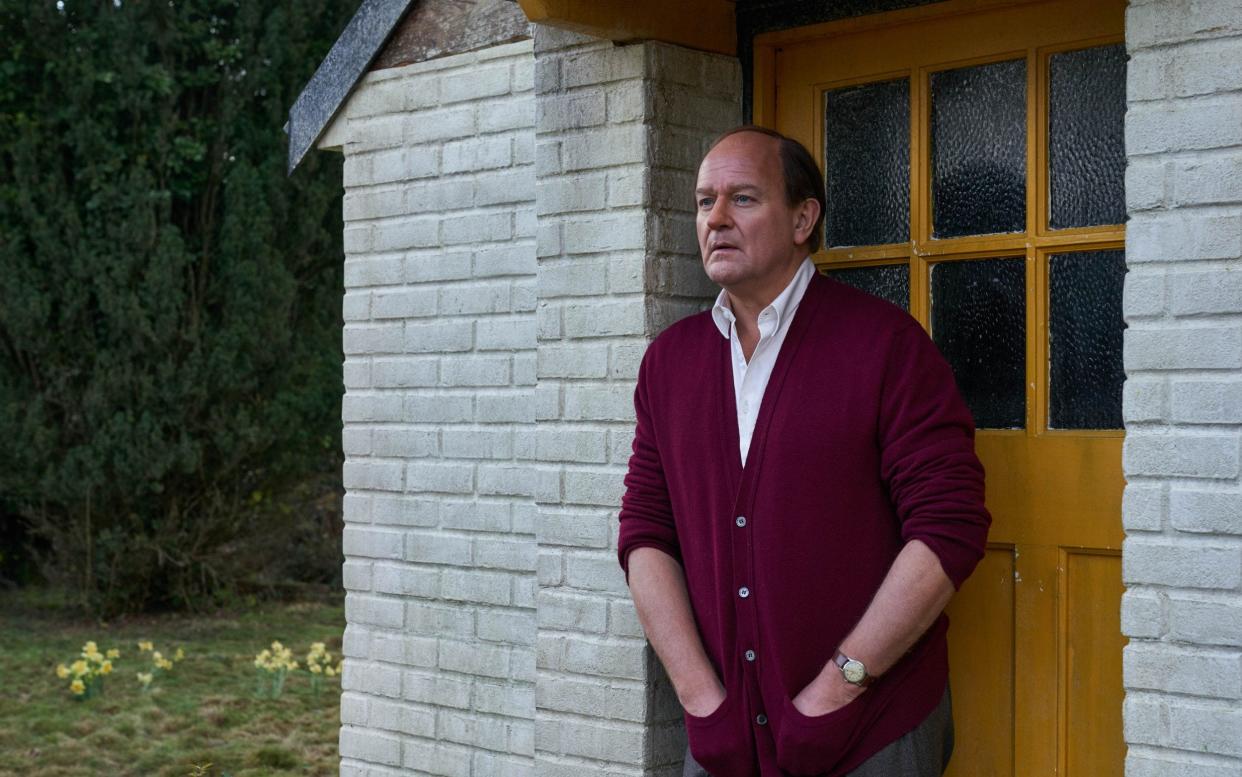To Olivia, review: Roald Dahl’s family tragedy gets a misleading makeover

Dir: John Hay. Cast: Hugh Bonneville, Keeley Hawes, Geoffrey Palmer, Conleth Hill, Sam Heughan. PG cert, 99 mins
There are many stories that might be told about the legendarily tempestuous 30-year marriage of Roald Dahl and Patricia Neal. So it’s a pity that the British biopic To Olivia chose to relate one that didn’t actually happen.
This film, a Sky Cinema Originals production, has certainly not been shameless enough to fabricate the death of the Dahls’ eldest daughter, Olivia, from post-measles encephalitis in 1962. That much was real. But everything that happens afterwards has been, let’s say, creatively reshuffled. The film invents an entire timeline that isn’t true, to jerry-rig for itself a neat recovery arc about the healing power of creativity.
To Olivia begins soon after the publication of James and the Giant Peach in 1961 – a modest success, even if it only sold a couple of thousand copies on its first, disappointing printing. The Dahls, played by Hugh Bonneville and Keeley Hawes, are pottering about in their Buckingham retreat of Great Missenden, when the unthinkable happens – 7-year-old Olivia (Darcey Ewart) takes a very sudden turn for the worse, and dies in hospital.
Unsurprisingly, the cracks in the Dahl marriage widen to awful chasms in the wake of their bereavement. Roald, squirrelled away in his writing shed for whole days, can barely stand to look at their two surviving children or mention Olivia by name, while Pat tries to keep calm and carry on, in a manner that seems Keeley-Hawes-esque to the max.
The way the film now spins it, Neal was excited to get the script for Hud, her strongest film role in years, despite Dahl’s grumbling that the character of Alma Brown amounted to a mere twenty pages. They fight – even in the presence of the director, Martin Ritt (Conleth Hill) – over whether she should fly to Hollywood and make it. “It’s not the right time,” Dahl argues, before losing his rag, meaning Neal accepts the role partly out of spite.
The trouble is, none of this happened during their bereavement. The merest Google search will show that shooting on Hud, on location in Texas and then in Paramount’s soundstages, was completed on August 1 1962. Olivia Dahl then died on November 17. Having addressed itself to Olivia, the film fixes her death for her, shifting it back a year or so to have its sentimental cake and eat it.
Some horrendously green-screened period backdrops of the Paramount gates and a Malibu rental home await. The first test-read with Paul Newman (a decent Sam Heughan, whom you might squint and genuinely mistake for the blue-eyed star) goes badly. But Neal figures out how to excel opposite him in the end, and her triumph at the Oscars in April 1964, which the Dahls celebrate while she’s pregnant again at home, suggests that plunging back into their work has been the couple’s salvation.
There was scope to do something imaginative with this, if the writing had made any effort with the specifics of the couple’s grief, or the Who’s Afraid of Virginia Woolf?-ish potential of their bitter verbal showdowns. Instead, tiffs and tantrums spring from nowhere. No sooner has Dahl heard Neal’s reaction to his finished draft of Charlie and the Chocolate Factory – which she adores – than he’s tearing it up in a random fit of rage.
Dahl may have been an egotistical crank, as is fairly well-attested, but it doesn’t do a great service to Bonneville – who captures something of the author’s gnarled intelligence – to make these supposed dramatic peaks into nothing more than ludicrous, ill-motivated strops. As for Hawes, her American accent’s perfectly fine, but the particular tough-mindedness and husky voice of the Kentucky-born Neal still seem an ocean away. I couldn’t help mentally recasting her with a Yank.
We can set aside everything that’s beyond the film’s remit – like the unmentioned serial adulteries which led the couple to divorce in 1983, Neal’s debilitating strokes, or their baby son Theo’s brain damage. We can try to block out Debbie Wiseman’s score, the musical equivalent of a whole can of golden syrup being upended onto a pancake.
But To Olivia still fails on its own terms, because everything it’s saying about the Dahls’ recovery and artistic regrowth rests on a blatant manipulation of the biographical truth. These bald facts might not be so bothersome if the film had a more daring sense of ambition, or a sincere core. But as a straight-up redemptive sob story with no other purpose, it cooks the books.
Available on Sky Cinema now

 Yahoo Movies
Yahoo Movies 
